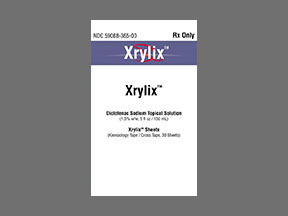
Xrylix Coupons & Savings Card – Discount Prices from $4273.11
My prescription
Edit
1.5%, Xrylix (1 Therapy Pack)
Select pharmacy

CVS
$4767.08
COUPON PRICE
Walmart
$4273.11
COUPON PRICE
Albertsons
$4274.79
COUPON PRICE
Walgreens
$4284.10
COUPON PRICEXrylix savings card
Show this card to your pharmacist
Walmart
$4273.11
BIN
ID
PCN
GRP
019876
LH5394A949
CHIPPO
LHX
Powered by
Related NSAIDs prescriptions
More prescriptions for rheumatoid arthritis
Related NSAIDs prescriptions
More prescriptions for rheumatoid arthritis
Price history for Xrylix
1 Therapy Pack, 1.5%
Average retail price for Xrylix
Average SaveHealth price for Xrylix
Our price history data is based on aggregated prescription data collected from participating pharmacies in America. Our prescription data updates daily to reflect the latest price changes. If you notice a missing data point, it means there wasn't sufficient data available to generate a monetary value for that date.
*Retail prices are based on pharmacy claims data, and may not be accurate when we don't have enough claims.
Xrylix dosage forms
Dosage Quantity Price from Per unit 1.5% 1 Therapy Pack $4273.11 $4273.11
| Dosage | Quantity | Price from | Per unit |
|---|---|---|---|
| 1.5% | 1 Therapy Pack | $4273.11 | $4273.11 |
Using the SaveHealth discount card, what is the price of Xrylix without insurance?
Using the SaveHealth discount card, the price of Xrylix without insurance is $4273.11.
What is the price of Xrylix at CVS?
The price of Xrylix at CVS is $4767.08.
What is the price of Xrylix at Walgreens?
The price of Xrylix at Walgreens is $4284.10.
What is the price of Xrylix at Walmart?
The price of Xrylix at Walmart is $4273.11.
